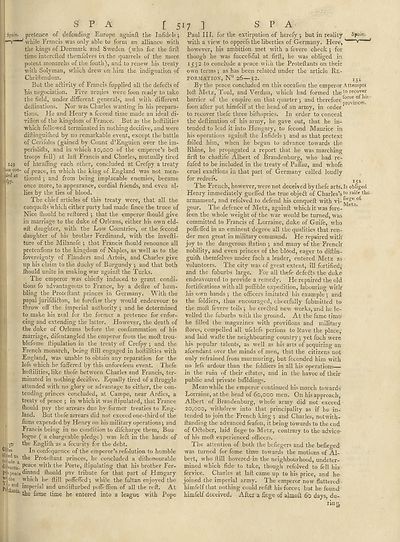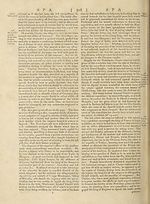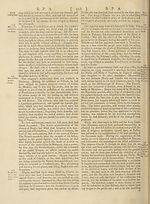Encyclopaedia Britannica, or, a Dictionary of arts, sciences, and miscellaneous literature : enlarged and improved. Illustrated with nearly six hundred engravings > Volume 19, Scripture-SUG
(565) Page 517
Download files
Complete book:
Individual page:
Thumbnail gallery: Grid view | List view

S PA [ 5
{Spain, pretence of defending Europe againft the Infidels;
I'T—while Francis was only able to form an alliance with
the kings of Denmark and Sweden (who for the fird
time interefted themfelves in the quarrels of the more
potent monarchs of the fouth), and to renew his treaty
with Solyman, which drew on him the indignation of
Chriftendom.
But the activity of Francis fupplied all the defects of
his negociation. Five armies were foon ready to take
the field, under different generals, and with different
deitinations. Nor was Charles wanting in his prepara¬
tions. He and Henry a fecond time made an ideal di-
vifion of the kingdom of France. But as the holtilities
which followed terminated in nothing decilive, and were
diftinguifhed by no remarkable event, except the battle
of Cerifoles (gained by Count d’Enguien over the im-
perialifts, and in which 10,000 of the emperor’s belt
troops fell) at laft Francis and Charles, mutually tired
149 of harafiing each other, concluded at Crefpy a treaty
bee ecn- 0f peace, in which the king of England was not men-
h%at ^one^ ’ an<^ from being implacable enemies, became
once more, to appearance, cordial friends, and even al¬
lies by the ties of blood.
The chief articles of this treaty were, that all the
conquefts which either party had made fince the truce of
Nice fliould be reftored 5 that the emperor fliould give
in marriage to the duke of Orleans, either his own eld-
eft daughter, with the Low Countries, or the fecond
daughter of his brother Ferdinand, with the invefti-
ture of the Milanefe ; that Francis ftiould renounce all
pretenfions to the kingdom of Naples, as Avell as to the
fovereignty of Flanders and Artois, and Charles give
up his claim to the duchy of Burgundy •, and that both
Ihould unite in making war againft the Turks.
The emperor was chiefly induced to grant condi¬
tions fo advantageous to France, by a deiire of hum¬
bling the Proteftant princes in Germany. With the
papal jurifdiffon, he forefaw they would endeavour to
throw off the imperial authority •, and he determined
to make his zeal for the former a pretence for enfor¬
cing and extending the latter. However, the death of
the duke of Orleans before the confummation of his
marriage, difentangled the emperor from the moft trou-
blefome ftipulation in the treaty of Crefpy ; and the
French monarch, being ftill engaged in hoftilities with
England, was unable to obtain any reparation for the
lofs which he fuffered by this unforefeen event. Thefe
hoftilities, like thofe between Charles and Francis, ter¬
minated in nothing decifive. Equally tired of a ftruggle
attended with no glory or advantage to either, the con¬
tending princes concluded, at Campe, near Ardies, a
treaty of peace ; in which it was ftipulated, that France
fliould pay the arrears due by former treaties to Eng¬
land. But thefe arrears did not exceed one-third of the
fums expended by Henry on his military operations’, and
Francis being in no condition to difeharge them, Bou
logne ( a chargeable pledge) was left in the hands of
the Englifh as a fecunty for the debt.
^ In confequence of the emperor’s refolution to humble
co udet0 ^>rote^ant princes, he concluded a diftionourable
jvanta- Peace whh the Porte, ftipulating that his brother Fer-
£<hpeace dinand ftiould pay tribute for that part of Hungary
*rthe which he ftill poffeffed4 while the fultan enjoyed the
and ;-1 1 \* n 1 1 nr n- r . i n » .
ip a in.
5°
Cfll,
I51
j$ftants imperial and undifturbed poffeflion of all the reft.
At
the fame time he entered into a league with Pope
17] SPA
Paul III. for the extirpation of herefy j but in reality
with a view to opprefs the liberties of Germany. Here,
however, his ambition met with a fevere check j for
though he was fuccefsful at firft, he was obliged in
1552 to conclude a peace with the Proteftants on their
own terms; as has been related under the article Re¬
formation, N° 26—32.
By the peace concluded on this oceafion the emperor Attempts
loft Metz, Toul, and Verdun, which had formed the’i0 recoy®f
barrier of the empire on that quarter j and thereforelome 0 lS
foon after put himfelf at the head of an army, in order1
to recover thefe three biftioprics. In order to conceal
the deftination of his army, he gave out, that he in¬
tended to lead it into Hungary, to fecond Maurice in
his operations againft the Infidels ; and as that pretext
failed him, when he began to advance towards the
Rhine, he propagated a report that he was marching
firft to chaftife Albert of Brandenburg, who had re-
fufed to be included in the treaty of Paffau, and whofe
cruel exaftions in that part of Germany called loudly
for redrefs. ll.1
The French, however, were not deceived by thefe arts. Is obliged
Henry immediately gueffed the true object of Charles’s10 rail‘‘_the
armament, and refolved to defend his conqueft with vi-
gour. The defence of Bfetz, againft which it was fore- *
leen the whole weight of the war would be turned, was
committed to Francis of Lorraine, duke of Guife, who
poffeffed in an eminent degree all the qualities that ren¬
der men great in military command. He repaired with
joy to the dangerous ftation •, and many of the French
nobility, and even princes of the blood, eager to diftin-
guifti themfelves under fuch a leader, entered Metz as
volunteers. The city was of great extent, ill fortified,
and the fuburbs large. For all thefe defeats the duke
endeavoured to provide a remedy. He repaired the old
fortifications with all poffible expedition, labouring with
his own hands ; the officers imitated his example j and
the foldiers, thus encouraged, cheerfully fubmitted to
the moft fevere toils; he eredfted new works, and he le¬
velled the fuburbs with the ground. At the fame time
he filled the magazines with provifions and military
ftores, compelled all uftlefs perfons to Rave the place,
and laid wafte the neighbouring country j yet fuch were
his popular talents, as well as his arts of acquiring an
afeendant over the minds of men, that the citizens not
only refrained from murmuring, but feconded him with
no lefs ardour than the foldiers in all his operations—
in the ruin of their eftates, and in the havoc of their
public and private buildings.
Meanwhile the emperor continued his march towards
Lorraine, at the head of 60,000 men. On his approach,
Albert of Brandenburg, whofe army did not exceed
20,000, withdrew into that principality as if he in¬
tended to join the French king ; and Charles, notwith-
ftanding the advanced feafon, it being towards to the end
of Offober, laid fiege to Metz, contrary to the advice'
of his moft experienced officers.
The attention of both the befiegers and the befieged
was turned for feme time towards the motions of Al¬
bert, who ftill hovered in the neighbourhood, undeter¬
mined which fide to take, though refolved to fell his
fervice. Charles at laft came up to his price, and he
joined the imperial army. The emperor now flattered
himfelf that nothing could refift his force ; but he found
himfelf deceived. After a fiege of almoft 60 days, du¬
ring
{Spain, pretence of defending Europe againft the Infidels;
I'T—while Francis was only able to form an alliance with
the kings of Denmark and Sweden (who for the fird
time interefted themfelves in the quarrels of the more
potent monarchs of the fouth), and to renew his treaty
with Solyman, which drew on him the indignation of
Chriftendom.
But the activity of Francis fupplied all the defects of
his negociation. Five armies were foon ready to take
the field, under different generals, and with different
deitinations. Nor was Charles wanting in his prepara¬
tions. He and Henry a fecond time made an ideal di-
vifion of the kingdom of France. But as the holtilities
which followed terminated in nothing decilive, and were
diftinguifhed by no remarkable event, except the battle
of Cerifoles (gained by Count d’Enguien over the im-
perialifts, and in which 10,000 of the emperor’s belt
troops fell) at laft Francis and Charles, mutually tired
149 of harafiing each other, concluded at Crefpy a treaty
bee ecn- 0f peace, in which the king of England was not men-
h%at ^one^ ’ an<^ from being implacable enemies, became
once more, to appearance, cordial friends, and even al¬
lies by the ties of blood.
The chief articles of this treaty were, that all the
conquefts which either party had made fince the truce of
Nice fliould be reftored 5 that the emperor fliould give
in marriage to the duke of Orleans, either his own eld-
eft daughter, with the Low Countries, or the fecond
daughter of his brother Ferdinand, with the invefti-
ture of the Milanefe ; that Francis ftiould renounce all
pretenfions to the kingdom of Naples, as Avell as to the
fovereignty of Flanders and Artois, and Charles give
up his claim to the duchy of Burgundy •, and that both
Ihould unite in making war againft the Turks.
The emperor was chiefly induced to grant condi¬
tions fo advantageous to France, by a deiire of hum¬
bling the Proteftant princes in Germany. With the
papal jurifdiffon, he forefaw they would endeavour to
throw off the imperial authority •, and he determined
to make his zeal for the former a pretence for enfor¬
cing and extending the latter. However, the death of
the duke of Orleans before the confummation of his
marriage, difentangled the emperor from the moft trou-
blefome ftipulation in the treaty of Crefpy ; and the
French monarch, being ftill engaged in hoftilities with
England, was unable to obtain any reparation for the
lofs which he fuffered by this unforefeen event. Thefe
hoftilities, like thofe between Charles and Francis, ter¬
minated in nothing decifive. Equally tired of a ftruggle
attended with no glory or advantage to either, the con¬
tending princes concluded, at Campe, near Ardies, a
treaty of peace ; in which it was ftipulated, that France
fliould pay the arrears due by former treaties to Eng¬
land. But thefe arrears did not exceed one-third of the
fums expended by Henry on his military operations’, and
Francis being in no condition to difeharge them, Bou
logne ( a chargeable pledge) was left in the hands of
the Englifh as a fecunty for the debt.
^ In confequence of the emperor’s refolution to humble
co udet0 ^>rote^ant princes, he concluded a diftionourable
jvanta- Peace whh the Porte, ftipulating that his brother Fer-
£<hpeace dinand ftiould pay tribute for that part of Hungary
*rthe which he ftill poffeffed4 while the fultan enjoyed the
and ;-1 1 \* n 1 1 nr n- r . i n » .
ip a in.
5°
Cfll,
I51
j$ftants imperial and undifturbed poffeflion of all the reft.
At
the fame time he entered into a league with Pope
17] SPA
Paul III. for the extirpation of herefy j but in reality
with a view to opprefs the liberties of Germany. Here,
however, his ambition met with a fevere check j for
though he was fuccefsful at firft, he was obliged in
1552 to conclude a peace with the Proteftants on their
own terms; as has been related under the article Re¬
formation, N° 26—32.
By the peace concluded on this oceafion the emperor Attempts
loft Metz, Toul, and Verdun, which had formed the’i0 recoy®f
barrier of the empire on that quarter j and thereforelome 0 lS
foon after put himfelf at the head of an army, in order1
to recover thefe three biftioprics. In order to conceal
the deftination of his army, he gave out, that he in¬
tended to lead it into Hungary, to fecond Maurice in
his operations againft the Infidels ; and as that pretext
failed him, when he began to advance towards the
Rhine, he propagated a report that he was marching
firft to chaftife Albert of Brandenburg, who had re-
fufed to be included in the treaty of Paffau, and whofe
cruel exaftions in that part of Germany called loudly
for redrefs. ll.1
The French, however, were not deceived by thefe arts. Is obliged
Henry immediately gueffed the true object of Charles’s10 rail‘‘_the
armament, and refolved to defend his conqueft with vi-
gour. The defence of Bfetz, againft which it was fore- *
leen the whole weight of the war would be turned, was
committed to Francis of Lorraine, duke of Guife, who
poffeffed in an eminent degree all the qualities that ren¬
der men great in military command. He repaired with
joy to the dangerous ftation •, and many of the French
nobility, and even princes of the blood, eager to diftin-
guifti themfelves under fuch a leader, entered Metz as
volunteers. The city was of great extent, ill fortified,
and the fuburbs large. For all thefe defeats the duke
endeavoured to provide a remedy. He repaired the old
fortifications with all poffible expedition, labouring with
his own hands ; the officers imitated his example j and
the foldiers, thus encouraged, cheerfully fubmitted to
the moft fevere toils; he eredfted new works, and he le¬
velled the fuburbs with the ground. At the fame time
he filled the magazines with provifions and military
ftores, compelled all uftlefs perfons to Rave the place,
and laid wafte the neighbouring country j yet fuch were
his popular talents, as well as his arts of acquiring an
afeendant over the minds of men, that the citizens not
only refrained from murmuring, but feconded him with
no lefs ardour than the foldiers in all his operations—
in the ruin of their eftates, and in the havoc of their
public and private buildings.
Meanwhile the emperor continued his march towards
Lorraine, at the head of 60,000 men. On his approach,
Albert of Brandenburg, whofe army did not exceed
20,000, withdrew into that principality as if he in¬
tended to join the French king ; and Charles, notwith-
ftanding the advanced feafon, it being towards to the end
of Offober, laid fiege to Metz, contrary to the advice'
of his moft experienced officers.
The attention of both the befiegers and the befieged
was turned for feme time towards the motions of Al¬
bert, who ftill hovered in the neighbourhood, undeter¬
mined which fide to take, though refolved to fell his
fervice. Charles at laft came up to his price, and he
joined the imperial army. The emperor now flattered
himfelf that nothing could refift his force ; but he found
himfelf deceived. After a fiege of almoft 60 days, du¬
ring
Set display mode to:
![]() Universal Viewer |
Universal Viewer | ![]() Mirador |
Large image | Transcription
Mirador |
Large image | Transcription
Images and transcriptions on this page, including medium image downloads, may be used under the Creative Commons Attribution 4.0 International Licence unless otherwise stated. ![]()
| Permanent URL | https://digital.nls.uk/192702627 |
|---|
| Attribution and copyright: |
|
|---|
| Description | Ten editions of 'Encyclopaedia Britannica', issued from 1768-1903, in 231 volumes. Originally issued in 100 weekly parts (3 volumes) between 1768 and 1771 by publishers: Colin Macfarquhar and Andrew Bell (Edinburgh); editor: William Smellie: engraver: Andrew Bell. Expanded editions in the 19th century featured more volumes and contributions from leading experts in their fields. Managed and published in Edinburgh up to the 9th edition (25 volumes, from 1875-1889); the 10th edition (1902-1903) re-issued the 9th edition, with 11 supplementary volumes. |
|---|---|
| Additional NLS resources: |
|

